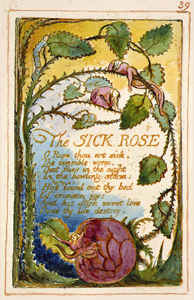The Sick Rose
O' Rose, thou art sick!
The invisible worm,
That flies in the night,
In the howling storm,
Has found out thy bed
of crimson joy;
And his dark secret love.
Does thy life destroy.
Summary
The speaker, addressing a rose, informs it that it is sick. An “invisible” worm has stolen into its bed in a “howling storm” and under the cover of night. The “dark secret love” of this worm is destroying the rose’s life.
Form
The two quatrains of this poem rhyme ABCB. The ominous rhythm of these short, two-beat lines contributes to the poem’s sense of foreboding or dread and complements the unflinching directness with which the speaker tells the rose she is dying.
Commentary
While the rose exists as a beautiful natural object that has become infected by a worm, it also exists as a literary rose, the conventional symbol of love. The image of the worm resonates with the Biblical serpent and also suggests a phallus. Worms are quintessentially earthbound, and symbolize death and decay. The “bed” into which the worm creeps denotes both the natural flowerbed and also the lovers’ bed. The rose is sick, and the poem implies that love is sick as well. Yet the rose is unaware of its sickness. Of course, an actual rose could not know anything about its own condition, and so the emphasis falls on the allegorical suggestion that it is love that does not recognize its own ailing state. This results partly from the insidious secrecy with which the “worm” performs its work of corruption—not only is it invisible, it enters the bed at night. This secrecy indeed constitutes part of the infection itself. The “crimson joy” of the rose connotes both sexual pleasure and shame, thus joining the two concepts in a way that Blake thought was perverted and unhealthy. The rose’s joyful attitude toward love is tainted by the aura of shame and secrecy that our culture attaches to love.
Source: sparknotes.com
O' Rose, thou art sick!
The invisible worm,
That flies in the night,
In the howling storm,
Has found out thy bed
of crimson joy;
And his dark secret love.
Does thy life destroy.
Summary
The speaker, addressing a rose, informs it that it is sick. An “invisible” worm has stolen into its bed in a “howling storm” and under the cover of night. The “dark secret love” of this worm is destroying the rose’s life.
Form
The two quatrains of this poem rhyme ABCB. The ominous rhythm of these short, two-beat lines contributes to the poem’s sense of foreboding or dread and complements the unflinching directness with which the speaker tells the rose she is dying.
Commentary
While the rose exists as a beautiful natural object that has become infected by a worm, it also exists as a literary rose, the conventional symbol of love. The image of the worm resonates with the Biblical serpent and also suggests a phallus. Worms are quintessentially earthbound, and symbolize death and decay. The “bed” into which the worm creeps denotes both the natural flowerbed and also the lovers’ bed. The rose is sick, and the poem implies that love is sick as well. Yet the rose is unaware of its sickness. Of course, an actual rose could not know anything about its own condition, and so the emphasis falls on the allegorical suggestion that it is love that does not recognize its own ailing state. This results partly from the insidious secrecy with which the “worm” performs its work of corruption—not only is it invisible, it enters the bed at night. This secrecy indeed constitutes part of the infection itself. The “crimson joy” of the rose connotes both sexual pleasure and shame, thus joining the two concepts in a way that Blake thought was perverted and unhealthy. The rose’s joyful attitude toward love is tainted by the aura of shame and secrecy that our culture attaches to love.
Source: sparknotes.com



نظر